译林版(2019)选择性必修第一册Unit 4 Exploring poetry Section B Grammar and usage 课件(20张ppt))
文档属性
| 名称 | 译林版(2019)选择性必修第一册Unit 4 Exploring poetry Section B Grammar and usage 课件(20张ppt)) | 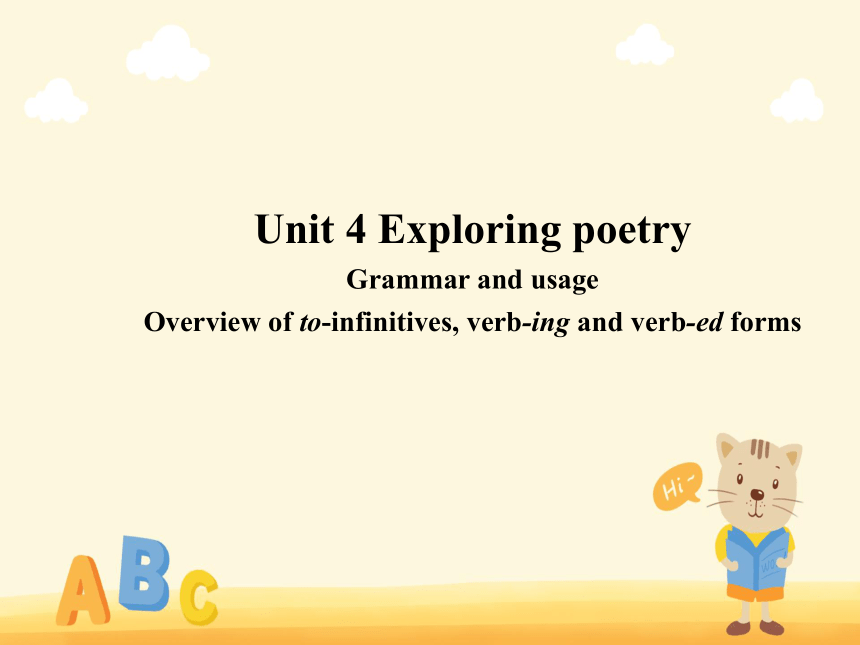 | |
| 格式 | pptx | ||
| 文件大小 | 2.9MB | ||
| 资源类型 | 教案 | ||
| 版本资源 | 牛津译林版(2019) | ||
| 科目 | 英语 | ||
| 更新时间 | 2022-10-22 18:04:13 | ||
图片预览


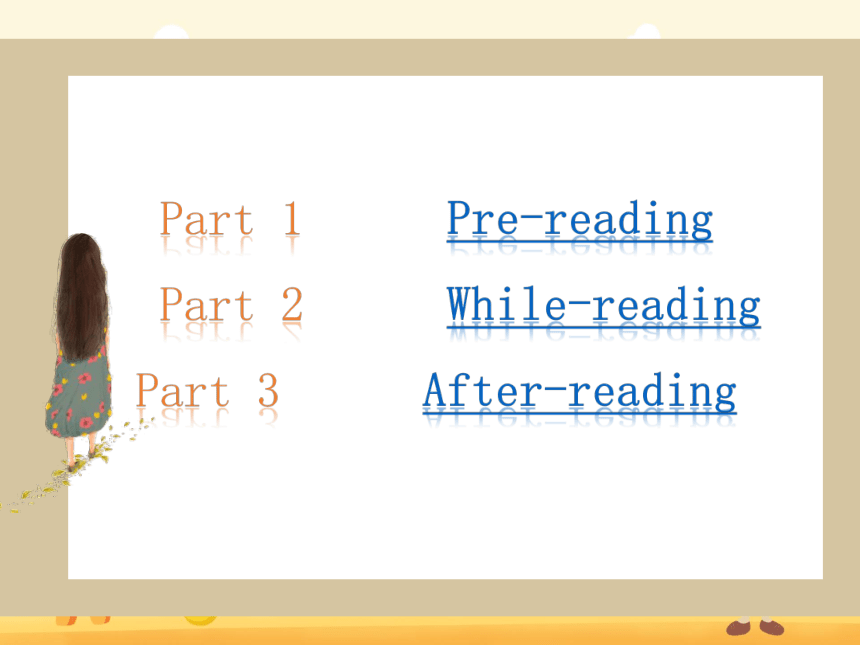
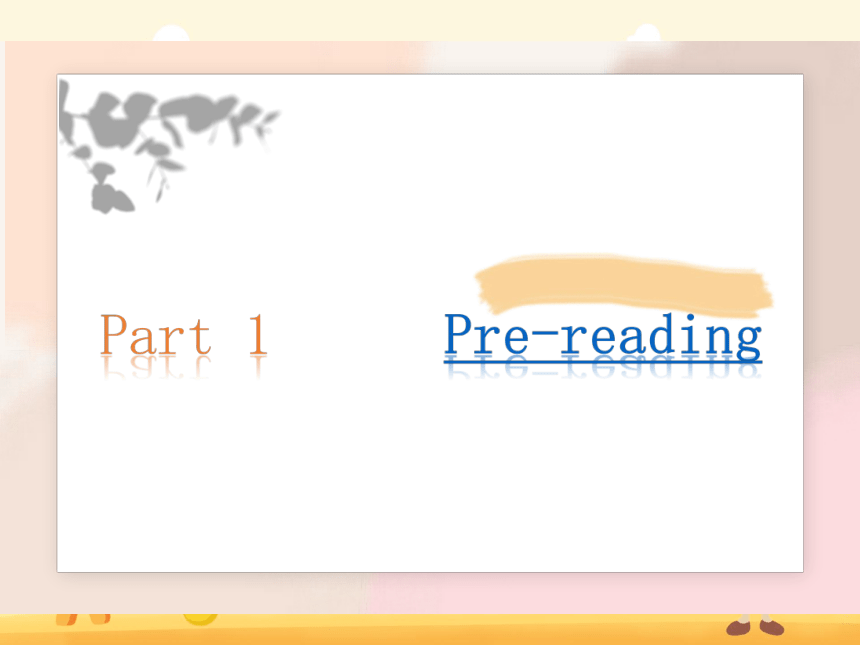
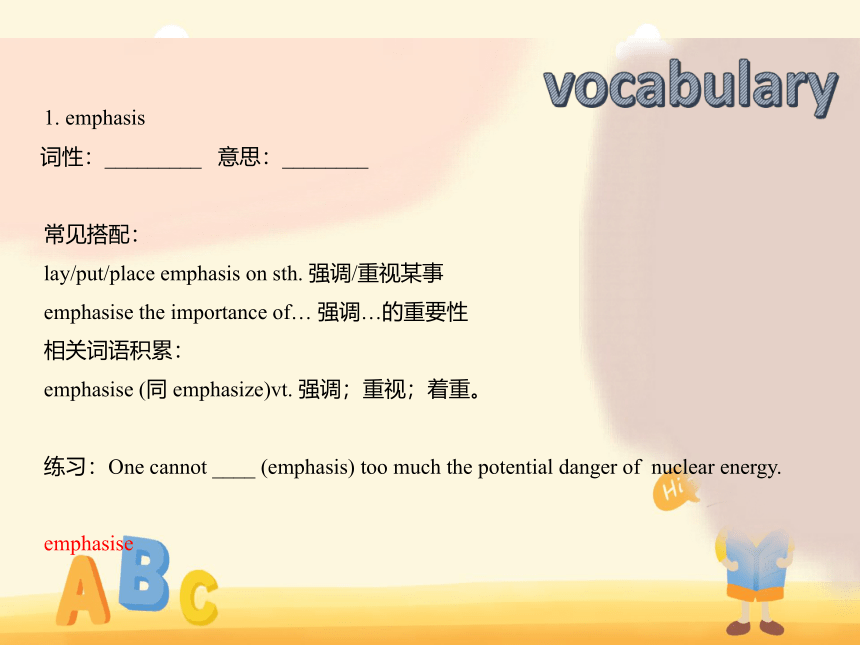
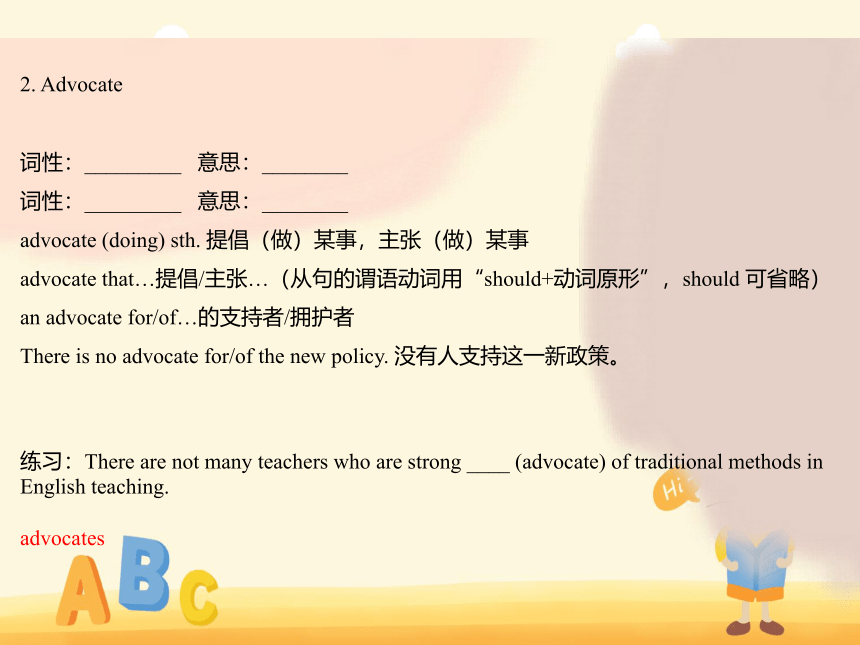
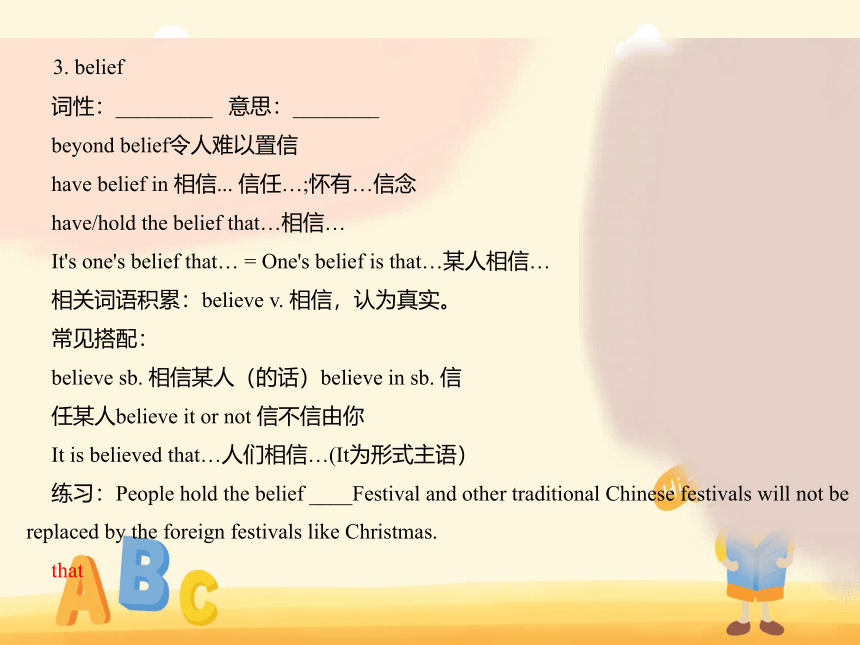
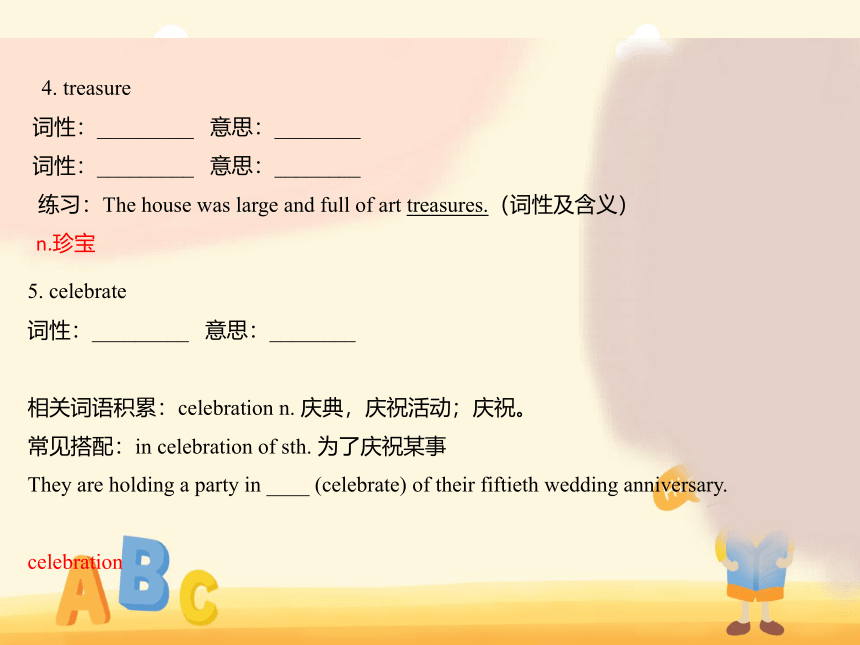
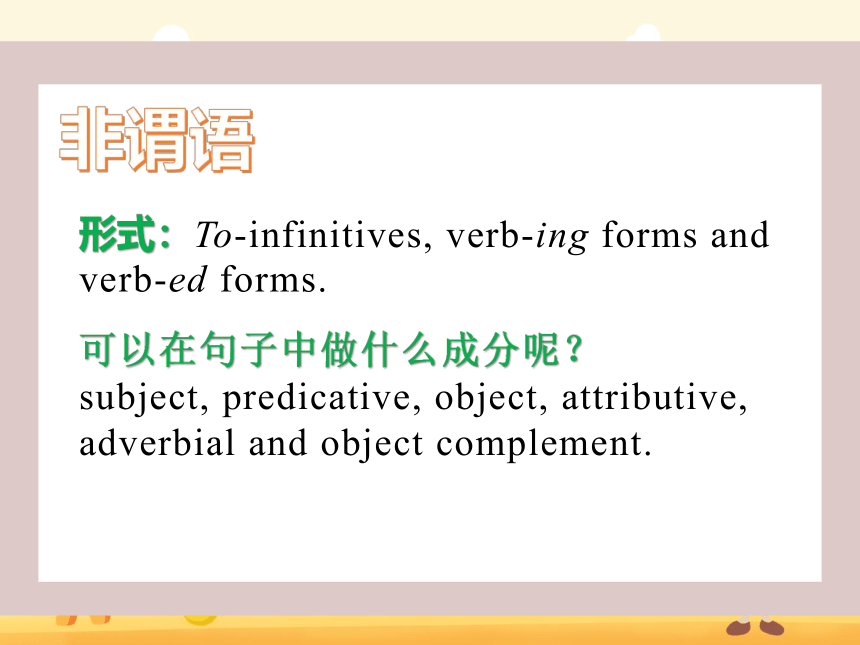
文档简介
(共20张PPT)
Unit 4 Exploring poetry
Grammar and usage
Overview of to-infinitives, verb-ing and verb-ed forms
Welcome to English
Part 1 Pre-reading
Part 2 While-reading
Part 3 After-reading
Part 1 Pre-reading
vocabulary
1. emphasis
词性:_________ 意思:________
常见搭配:
lay/put/place emphasis on sth. 强调/重视某事
emphasise the importance of… 强调…的重要性
相关词语积累:
emphasise (同 emphasize)vt. 强调;重视;着重。
练习:One cannot ____ (emphasis) too much the potential danger of nuclear energy.
emphasise
2. Advocate
词性:_________ 意思:________
词性:_________ 意思:________
advocate (doing) sth. 提倡(做)某事,主张(做)某事
advocate that…提倡/主张…(从句的谓语动词用“should+动词原形”,should 可省略)
an advocate for/of…的支持者/拥护者
There is no advocate for/of the new policy. 没有人支持这一新政策。
练习:There are not many teachers who are strong ____ (advocate) of traditional methods in English teaching.
advocates
3. belief
词性:_________ 意思:________
beyond belief令人难以置信
have belief in 相信... 信任…;怀有…信念
have/hold the belief that…相信…
It's one's belief that… = One's belief is that…某人相信…
相关词语积累:believe v. 相信,认为真实。
常见搭配:
believe sb. 相信某人(的话)believe in sb. 信
任某人believe it or not 信不信由你
It is believed that…人们相信…(It为形式主语)
练习:People hold the belief ____Festival and other traditional Chinese festivals will not be replaced by the foreign festivals like Christmas.
that
4. treasure
词性:_________ 意思:________
词性:_________ 意思:________
练习:The house was large and full of art treasures.(词性及含义)
n.珍宝
5. celebrate
词性:_________ 意思:________
相关词语积累:celebration n. 庆典,庆祝活动;庆祝。
常见搭配:in celebration of sth. 为了庆祝某事
They are holding a party in ____ (celebrate) of their fiftieth wedding anniversary.
celebration
非谓语
形式:To-infinitives, verb-ing forms and verb-ed forms.
可以在句子中做什么成分呢?
subject, predicative, object, attributive, adverbial and object complement.
Part 2 While-reading
Exploring the rules
阅读关于浪漫主义的文章,并填写part A 的表格
Subjects …, celebrating the beauty of nature and country life became a common theme in Romantic poetry.
Predicatives The aim of the Romantics was to break with …
Romantic poets were often not pleased with …
… they were not always interested in …
Objects … they refused to follow rigid rules; …
Instead, they advocated going back to nature.
Complements … people were made to work long hours.
Attributives … a process called industrialization.
Adverbials Exploring the world of emotion and showing the beauty of nature, …
Exploring the rules
The to-infinitive often refers to an action that will happen in the future; the verb-ing form, a continuing action; and the verb-ed form, a past action.
Generally speaking, the verb-ing form expresses a(n) (1) ________ (active/passive) meaning, while the verb-ed form expresses a(n) (2) ________ (active/passive) meaning.
The to-infinitive can be used as the (3) ____________ of a sentence.
The verb-ing form can be used as the (4) ____________ of a sentence.
The verb-ed form can be used as the (5) ________ of a sentence.
*You can choose more than one answer for each blank.
a. subject b. predicative c. object
d. complement e. attributive f. adverbial
答案:active; passive; abcdef; abcdef; bdef
浏览课本95-98页
了解更多非谓语知识吧
!!!
Part 2 After-reading
Applying the rules
完成B1练习
1. Romantic poets experimented with new poetic forms. They were particularly interested in it.
Romantic poets were particularly __________________________________.
2. Romantic poets often mentioned the effect of beauty on the poet’s imagination when they described natural scenes.
Romantic poets often mentioned the effect of beauty on the poet’s imagination when _____________________.
3. Poems that focus on nature often stress the moment of inspiration.
Poems _______________ often stress the moment of inspiration.
interested in experimenting with new poetic forms;
describing natural scenes;
focusing on nature;
4. Many Romantic poems are filled with descriptions of magic and ancient themes, and contain rich sensory details.
________________many Romantic poems contain rich sensory details.
5. Since Romantic poets were highly colourful and independent individuals, finding concerns common to all of them is sometimes difficult.
Since Romantic poets were all highly colourful and independent individuals, it is sometimes difficult__________________.
Filled with descriptions of magic and ancient themes;
to find concerns common to all of them.
完成B2练习
Born in 1770, William Wordsworth was one of the (1) _________ (lead) poets of the Romantic movement in England. (2) _______ (grow) up in the beautiful Lake District, Wordsworth had a childhood that was perfect for a developing poet. (3) __________ (educate) at Cambridge, Wordsworth received his degree in 1791. He spent a lot of time (4) ________ (tour) in Europe. Travelling obviously provided Wordsworth with plenty of ideas for his poems. In 1795, he met Samuel Taylor Coleridge and the two talented young men became close friends. (5) _______ (meet) Coleridge had a huge impact on Wordsworth. Lyrical Ballads, a collection of poems (6) _______ (write) together with Coleridge, was Wordsworth’s first great work. It was published in 1798 and marked the start of the Romantic era in poetry. Wordsworth explained that they wanted to write poetry that ordinary people could use (7) ________ (express) their feelings. Many of the poems in the collection were about returning to nature. Like other Romantics, Wordsworth preferred (8) __________ (live) in the country rather than in the city.
leading; growing; educated; touring; Meeting; written; to express; living/ to live
Applying the rules
完成B3练习
The importance of reading poems
Reading poems helps develop deep insight into what the poet wants to express. Every poem is unique to its poet and its message might first need to be discovered before it can be understood. A poem also represents what the poet was experiencing at that time, such as passion or sorrow. When I read a poem, I want to discover and understand the poet’s message. So I often think about what the poet was going through at that time. Understanding the poet’s thoughts and feelings opens up a whole new world for me and keeps me from getting bored.
Unit 4 Exploring poetry
Grammar and usage
Overview of to-infinitives, verb-ing and verb-ed forms
Welcome to English
Part 1 Pre-reading
Part 2 While-reading
Part 3 After-reading
Part 1 Pre-reading
vocabulary
1. emphasis
词性:_________ 意思:________
常见搭配:
lay/put/place emphasis on sth. 强调/重视某事
emphasise the importance of… 强调…的重要性
相关词语积累:
emphasise (同 emphasize)vt. 强调;重视;着重。
练习:One cannot ____ (emphasis) too much the potential danger of nuclear energy.
emphasise
2. Advocate
词性:_________ 意思:________
词性:_________ 意思:________
advocate (doing) sth. 提倡(做)某事,主张(做)某事
advocate that…提倡/主张…(从句的谓语动词用“should+动词原形”,should 可省略)
an advocate for/of…的支持者/拥护者
There is no advocate for/of the new policy. 没有人支持这一新政策。
练习:There are not many teachers who are strong ____ (advocate) of traditional methods in English teaching.
advocates
3. belief
词性:_________ 意思:________
beyond belief令人难以置信
have belief in 相信... 信任…;怀有…信念
have/hold the belief that…相信…
It's one's belief that… = One's belief is that…某人相信…
相关词语积累:believe v. 相信,认为真实。
常见搭配:
believe sb. 相信某人(的话)believe in sb. 信
任某人believe it or not 信不信由你
It is believed that…人们相信…(It为形式主语)
练习:People hold the belief ____Festival and other traditional Chinese festivals will not be replaced by the foreign festivals like Christmas.
that
4. treasure
词性:_________ 意思:________
词性:_________ 意思:________
练习:The house was large and full of art treasures.(词性及含义)
n.珍宝
5. celebrate
词性:_________ 意思:________
相关词语积累:celebration n. 庆典,庆祝活动;庆祝。
常见搭配:in celebration of sth. 为了庆祝某事
They are holding a party in ____ (celebrate) of their fiftieth wedding anniversary.
celebration
非谓语
形式:To-infinitives, verb-ing forms and verb-ed forms.
可以在句子中做什么成分呢?
subject, predicative, object, attributive, adverbial and object complement.
Part 2 While-reading
Exploring the rules
阅读关于浪漫主义的文章,并填写part A 的表格
Subjects …, celebrating the beauty of nature and country life became a common theme in Romantic poetry.
Predicatives The aim of the Romantics was to break with …
Romantic poets were often not pleased with …
… they were not always interested in …
Objects … they refused to follow rigid rules; …
Instead, they advocated going back to nature.
Complements … people were made to work long hours.
Attributives … a process called industrialization.
Adverbials Exploring the world of emotion and showing the beauty of nature, …
Exploring the rules
The to-infinitive often refers to an action that will happen in the future; the verb-ing form, a continuing action; and the verb-ed form, a past action.
Generally speaking, the verb-ing form expresses a(n) (1) ________ (active/passive) meaning, while the verb-ed form expresses a(n) (2) ________ (active/passive) meaning.
The to-infinitive can be used as the (3) ____________ of a sentence.
The verb-ing form can be used as the (4) ____________ of a sentence.
The verb-ed form can be used as the (5) ________ of a sentence.
*You can choose more than one answer for each blank.
a. subject b. predicative c. object
d. complement e. attributive f. adverbial
答案:active; passive; abcdef; abcdef; bdef
浏览课本95-98页
了解更多非谓语知识吧
!!!
Part 2 After-reading
Applying the rules
完成B1练习
1. Romantic poets experimented with new poetic forms. They were particularly interested in it.
Romantic poets were particularly __________________________________.
2. Romantic poets often mentioned the effect of beauty on the poet’s imagination when they described natural scenes.
Romantic poets often mentioned the effect of beauty on the poet’s imagination when _____________________.
3. Poems that focus on nature often stress the moment of inspiration.
Poems _______________ often stress the moment of inspiration.
interested in experimenting with new poetic forms;
describing natural scenes;
focusing on nature;
4. Many Romantic poems are filled with descriptions of magic and ancient themes, and contain rich sensory details.
________________many Romantic poems contain rich sensory details.
5. Since Romantic poets were highly colourful and independent individuals, finding concerns common to all of them is sometimes difficult.
Since Romantic poets were all highly colourful and independent individuals, it is sometimes difficult__________________.
Filled with descriptions of magic and ancient themes;
to find concerns common to all of them.
完成B2练习
Born in 1770, William Wordsworth was one of the (1) _________ (lead) poets of the Romantic movement in England. (2) _______ (grow) up in the beautiful Lake District, Wordsworth had a childhood that was perfect for a developing poet. (3) __________ (educate) at Cambridge, Wordsworth received his degree in 1791. He spent a lot of time (4) ________ (tour) in Europe. Travelling obviously provided Wordsworth with plenty of ideas for his poems. In 1795, he met Samuel Taylor Coleridge and the two talented young men became close friends. (5) _______ (meet) Coleridge had a huge impact on Wordsworth. Lyrical Ballads, a collection of poems (6) _______ (write) together with Coleridge, was Wordsworth’s first great work. It was published in 1798 and marked the start of the Romantic era in poetry. Wordsworth explained that they wanted to write poetry that ordinary people could use (7) ________ (express) their feelings. Many of the poems in the collection were about returning to nature. Like other Romantics, Wordsworth preferred (8) __________ (live) in the country rather than in the city.
leading; growing; educated; touring; Meeting; written; to express; living/ to live
Applying the rules
完成B3练习
The importance of reading poems
Reading poems helps develop deep insight into what the poet wants to express. Every poem is unique to its poet and its message might first need to be discovered before it can be understood. A poem also represents what the poet was experiencing at that time, such as passion or sorrow. When I read a poem, I want to discover and understand the poet’s message. So I often think about what the poet was going through at that time. Understanding the poet’s thoughts and feelings opens up a whole new world for me and keeps me from getting bored.
同课章节目录
- Unit 1 Food matters
- Welcome to the unit
- Reading
- Grammar and usage
- Integrated skills
- Extended reading
- Project
- Unit 2 The Universal Language
- Welcome to the unit
- Reading
- Grammar and usage
- Integrated skills
- Extended reading
- Project
- Unit 3 The art of painting
- Welcome to the unit
- Reading
- Grammar and usage
- Integrated skills
- Extended reading
- Project
- Unit 4 Exploring poetry
- Welcome to the unit
- Reading
- Grammar and usage
- Integrated skills
- Extended reading
- Project
